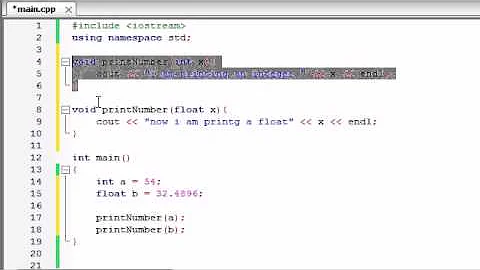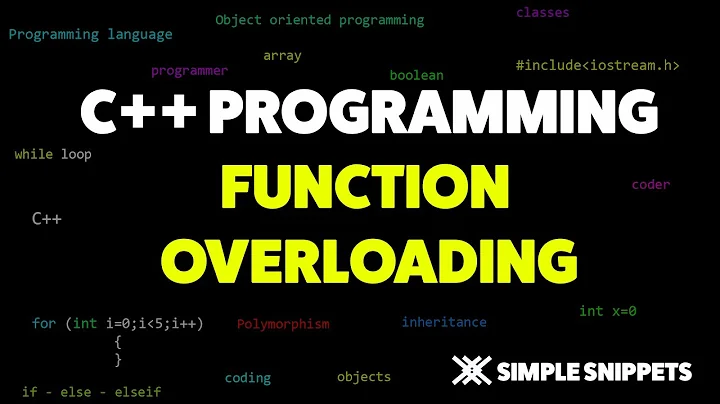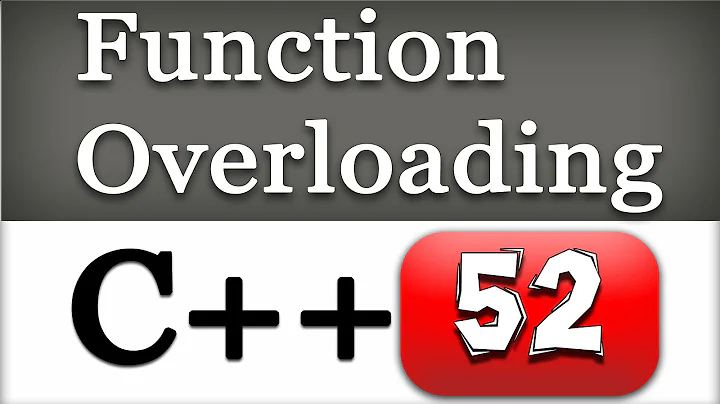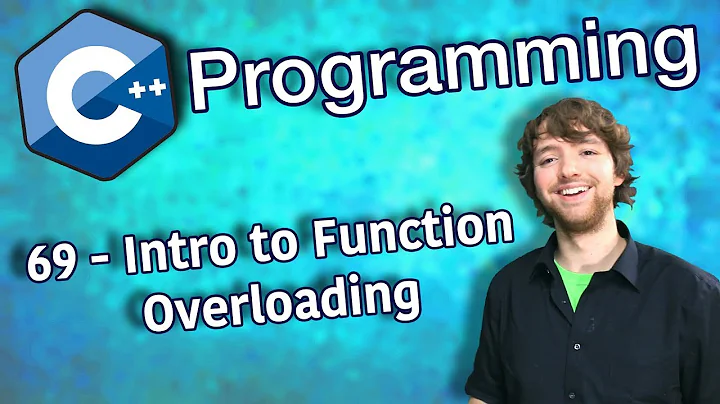C++ - statement cannot resolve address for overloaded function
Solution 1
std::endl is a function template. Normally, it's used as an argument to the insertion operator <<. In that case, the operator<< of the stream in question will be defined as e.g. ostream& operator<< ( ostream& (*f)( ostream& ) ). The type of the argument of f is defined, so the compiler will then know the exact overload of the function.
It's comparable to this:
void f( int ){}
void f( double ) {}
void g( int ) {}
template<typename T> void ft(T){}
int main(){
f; // ambiguous
g; // unambiguous
ft; // function template of unknown type...
}
But you can resolve the ambiguity by some type hints:
void takes_f_int( void (*f)(int) ){}
takes_f_int( f ); // will resolve to f(int) because of `takes_f_int` signature
(void (*)(int)) f; // selects the right f explicitly
(void (*)(int)) ft; // selects the right ft explicitly
That's what happens normally with std::endl when supplied as an argument to operator <<: there is a definition of the function
typedef (ostream& (*f)( ostream& ) ostream_function;
ostream& operator<<( ostream&, ostream_function )
And this will enable the compiler the choose the right overload of std::endl when supplied to e.g. std::cout << std::endl;.
Nice question!
Solution 2
The most likely reason I can think of is that it's declaration is:
ostream& endl ( ostream& os );
In other words, without being part of a << operation, there's no os that can be inferred. I'm pretty certain this is the case since the line:
std::endl (std::cout);
compiles just fine.
My question to you is: why would you want to do this?
I know for a fact that 7; is a perfectly valid statement in C but you don't see that kind of rubbish polluting my code :-)
Solution 3
std::endl is a manipulator. It's actually a function that is called by the a version of the << operator on a stream.
std::cout << std::endl
// would call
std::endl(std::cout).
Solution 4
std::endl is a function template. If you use it in a context where the template argument cannot be uniquely determined you have to disambiguate which specialization you mean. For example you can use an explicit cast or assign it to a variable of the correct type.
e.g.
#include <ostream>
int main()
{
// This statement has no effect:
static_cast<std::ostream&(*)(std::ostream&)>( std::endl );
std::ostream&(*fp)(std::ostream&) = std::endl;
}
Usually, you just use it in a context where the template argument is deduced automatically.
#include <iostream>
#include <ostream>
int main()
{
std::cout << std::endl;
std::endl( std::cout );
}
Solution 5
http://www.cplusplus.com/reference/iostream/manipulators/endl/
You can't have std::endl by itself because it requires a basic_ostream as a type of parameter. It's the way it is defined.
It's like trying to call my_func() when the function is defined as void my_func(int n)
Related videos on Youtube
Simplicity
Updated on July 09, 2022Comments
-
 Simplicity almost 2 years
Simplicity almost 2 yearsWhen I types the following as a stand-alone line:
std::endl;I got the following error:
statement cannot resolve address for overloaded functionWhy is that? Cannot I write
std::endl;as a stand-alone line?Thanks.
-
 TOMKA over 13 yearsWhich stream's line would it end?
TOMKA over 13 yearsWhich stream's line would it end?
-
-
 Simplicity over 13 yearsI made it that way for the seek of readability, and that tells a newline has been inserted after some statement. But, seems it is invalid to write it the way I did. Thanks
Simplicity over 13 yearsI made it that way for the seek of readability, and that tells a newline has been inserted after some statement. But, seems it is invalid to write it the way I did. Thanks -
 CB Bailey over 13 years
CB Bailey over 13 yearsstd::endlis a single function template, not a function or set of overloaded functions. If it were just a single function the statementstd::endl;would be fine (if pointless). -
 xtofl over 13 years@Charles Bailey: corrected for that; would it change the reasoning a lot? I don't think so. The ambiguity is resolved using the
xtofl over 13 years@Charles Bailey: corrected for that; would it change the reasoning a lot? I don't think so. The ambiguity is resolved using theoperator <<in casu. -
 CB Bailey over 13 yearsIt makes the reasoning more applicable, if anything.
CB Bailey over 13 yearsIt makes the reasoning more applicable, if anything. -
 Martin York over 13 yearsYour obfuscating the real answer. It just needs a parameter.
Martin York over 13 yearsYour obfuscating the real answer. It just needs a parameter. -
 xtofl over 13 years@Martin York: my guess was OP wanted to know "what did the compiler mean", not "how should I use
xtofl over 13 years@Martin York: my guess was OP wanted to know "what did the compiler mean", not "how should I usestd::endl". I didn't know, either. Indeed,std::endlis a function, as stated clearly in this and other answers, but the interesting thing is I never needed to ask myself that - it just worked. In the solitary, nonsensical expressionstd::endl;, the compiler suddenly didn't have a way to know what to do. I think it's a very good question, and I think I learned something by answering it, and that OP learned something by reading it. -
 xtofl over 13 years@Martin York: ... and you must admit that most people never thought about giving
xtofl over 13 years@Martin York: ... and you must admit that most people never thought about givingstd::endla parameter. -
 orzechow over 10 yearsVery interesting! Especially because it's the same for std::flush, which I didn't expect to use the << operator.
orzechow over 10 yearsVery interesting! Especially because it's the same for std::flush, which I didn't expect to use the << operator.






